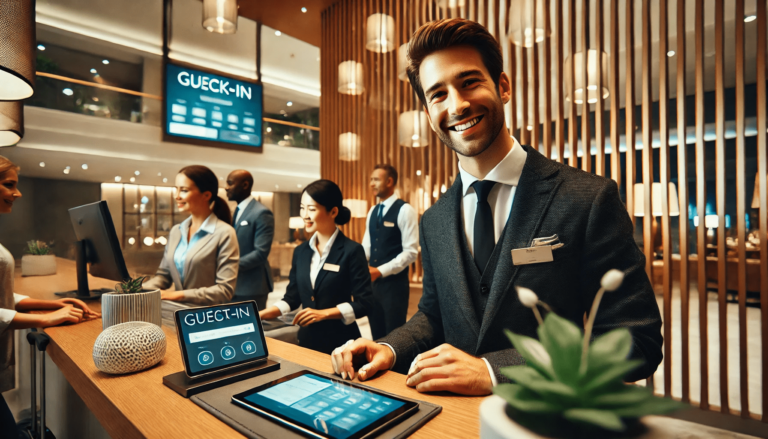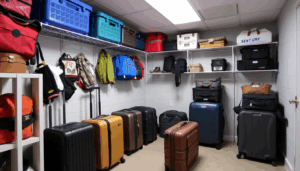Gasttevredenheid in hotels is een hoeksteen van succes in de horeca. In de huidige concurrerende markt is het bereiken van een hoog niveau van gasttevredenheid is crucialer dan ooit. Het heeft niet alleen invloed op repeat business en loyaliteit van gasten, maar ook op online beoordelingen en de algehele reputatie. Dit artikel gaat in op de verschillende aspecten van gasttevredenheid en belicht strategieën die hotels kunnen toepassen om de gastervaring te verbeteren en zo hun reputatie in de markt te verbeteren. horeca.
Inzicht in gasttevredenheid in de horeca
Gasttevredenheid in de horeca verwijst naar de mate waarin de producten en diensten van een hotel voldoen aan de verwachtingen van de gasten of deze overtreffen. Het is een kritieke maatstaf omdat het een directe invloed heeft op het vermogen van een hotel om klanten aan te trekken en te behouden. Een tevreden gast zal eerder terugkeren en het hotel aanbevelen aan anderen, terwijl een ontevreden gast kan leiden tot negatieve beoordelingen en een beschadigde reputatie.
Klanttevredenheid hotel De statistieken omvatten vaak verschillende factoren, zoals de kwaliteit van de kamer, klantenservice, voorzieningen, netheid en de algehele gastervaring. In de horecaDe gastervaring begint al voordat een gast aankomt in het pand en gaat door nadat hij is vertrokken. Deze uitgebreide reis omvat elk contactmoment dat de gast heeft met het hotel, van het boekingsproces tot hun vertrek en daarna.
Belangrijkste factoren die de tevredenheid van gasten in hotels beïnvloeden
-
Kwaliteit van service: Een van de belangrijkste factoren die invloed hebben op gasttevredenheid in de horeca is de kwaliteit van de service van het hotelpersoneel. Dit omvat de vriendelijkheid, professionaliteit en reactiesnelheid van het personeel. Persoonlijke service, waarbij het personeel de namen en voorkeuren van de gasten onthoudt, kan de kwaliteit van de service enorm verbeteren. klanttevredenheid hotel niveaus.
-
Netheid en comfort: De netheid van het hotel, met inbegrip van de kamers, gemeenschappelijke ruimten en faciliteiten, is een fundamentele verwachting. Elk falen in dit opzicht kan aanzienlijk afbreuk doen aan gasttevredenheid. Comfort, inclusief de kwaliteit van de bedden, de kamertemperatuur en het geluidsniveau, speelt ook een cruciale rol bij het vormgeven van de gastervaring.
-
Voorzieningen en faciliteiten: Gasten kiezen hotels vaak op basis van de beschikbare voorzieningen en faciliteiten, zoals zwembaden, spa's, sportscholen en eetgelegenheden. De beschikbaarheid van hoogwaardige voorzieningen draagt bij aan de algehele klanttevredenheid hotel scores. Daarnaast kan het aanbieden van unieke of gepersonaliseerde voorzieningen een hotel onderscheiden van de concurrentie, waardoor het nog beter scoort. gasttevredenheid in de horeca.
-
Technologie en gemak: In het huidige digitale tijdperk verwachten gasten een naadloze integratie van technologie tijdens hun verblijf. Dit omvat betrouwbare Wi-Fi, eenvoudige in- en uitcheckprocessen, slimme kamerbediening en toegang tot informatie via hotelapps. Het integreren van technologie die het gemak verhoogt, kan de service aanzienlijk verbeteren. gasttevredenheid.
-
Voedsel- en drankkwaliteit: De kwaliteit en variëteit van het eten en drinken in een hotel kan een grote invloed hebben op klanttevredenheid hotel beoordelingen. Het aanbieden van een scala aan eetervaringen, van casual tot fine dining, met opties die tegemoet komen aan verschillende dieetwensen, kan positief bijdragen aan gasttevredenheid.
-
Consistentie in service: Consistentie is de sleutel in de horeca. Gasten verwachten bij elk bezoek aan een hotel hetzelfde serviceniveau. Consistente kwaliteit op alle contactpunten zorgt ervoor dat gasten zich gewaardeerd en gerespecteerd voelen, wat van vitaal belang is voor het handhaven van hoge gasttevredenheid.
-
Omgaan met feedback van gasten: Het actief zoeken naar en effectief reageren op feedback van gasten is cruciaal voor het behouden van een hoog niveau van gasttevredenheid in de horeca. Door klachten direct aan te pakken en negatieve ervaringen om te zetten in positieve, kunnen ontevreden gasten veranderen in loyale klanten.
Strategieën voor het verbeteren van de tevredenheid van gasten in hotels
Om gasttevredenheid in de horecamoeten hotels een strategische aanpak hanteren die zich richt op het verbeteren van elk aspect van de gastervaring. Hier zijn enkele effectieve strategieën:
-
Investeer in de opleiding van personeel: Training van personeel is van vitaal belang om ervoor te zorgen dat alle werknemers een uitstekende service kunnen bieden. De training moet gericht zijn op communicatievaardigheden, het oplossen van problemen en het begrijpen van de behoeften van gasten om klanttevredenheid hotel metriek.
-
Technologie benutten: Het implementeren van technologische oplossingen zoals mobiel inchecken, digitale conciërgediensten en slimme kamerbediening kan de gastervaring verbeteren door gemak te bieden en wrijving tijdens het verblijf van de gast te verminderen.
-
De gastervaring personaliseren: Personalisatie kan een aanzienlijke invloed hebben op gasttevredenheid. Hotels zouden gegevens van gasten moeten gebruiken om diensten te personaliseren, zoals het aanbieden van een voorkeurskamertype, welkomstvoorzieningen of eetgelegenheden die overeenkomen met de voorkeuren van de gast.
-
Verbeter ervaringen in de kamer: Investeren in beddengoed van hoge kwaliteit, moderne voorzieningen en slimme technologie kan het comfort van de kamers verbeteren. Het aanbieden van unieke accenten, zoals een minibar of lokale ambachtelijke producten, kan de ervaring op de kamer nog verder verbeteren.
-
Focus op netheid en onderhoud: Regelmatig onderhoud en strikte reinheidsprotocollen zijn essentieel om ervoor te zorgen dat het hotel voldoet aan de verwachtingen van de gasten. Een schoon en goed onderhouden pand is een fundamentele vereiste voor hoge klanttevredenheid hotel beoordelingen.
-
Feedback van gasten aanmoedigen en erop reageren: Hotels moeten actief op zoek gaan naar feedback van gasten via enquêtes en beoordelingsplatforms. Luisteren naar gasten en het doorvoeren van noodzakelijke verbeteringen toont een toewijding aan gasttevredenheid in de horeca.
De rol van Deliverback in het verhogen van de gasttevredenheid
Naast de bovengenoemde strategieën kan de integratie van innovatieve oplossingen zoals Deliverback het volgende nog verbeteren gasttevredenheid en de online waardering van een hotel verbeteren. Deliverback is een dienst die is ontworpen om hotels te helpen bij het efficiënt beheren van gevonden voorwerpen, een kritiek aspect dat vaak over het hoofd wordt gezien in de horeca.
Hoe Deliverback werkt
Deliverback vereenvoudigt het proces van het teruggeven van verloren voorwerpen aan gasten. Wanneer een gast een voorwerp achterlaat, kan het hotelpersoneel dit snel registreren in het Deliverback-systeem. Het systeem automatiseert vervolgens het proces om de gast op de hoogte te stellen en de teruggave van het item te regelen. Dit naadloze proces bespaart niet alleen tijd voor het hotelpersoneel, maar verbetert ook de ervaring van de gast door ervoor te zorgen dat hij zijn verloren bezittingen snel en efficiënt ontvangt.
Voordelen van Deliverback voor hotels
-
Verbeterde gasttevredenheid: Gasten waarderen een snelle en efficiënte afhandeling van verloren voorwerpen. Door gebruik te maken van Deliverback kunnen hotels ervoor zorgen dat items snel worden geretourneerd. gasttevredenheid in de horeca. Een gast die zijn verloren bezittingen zonder problemen terugkrijgt, zal het hotel waarschijnlijk gunstiger beoordelen en misschien zelfs zijn positieve ervaring delen in beoordelingen.
-
Verbeterde online beoordelingen: In de huidige digitale wereld spelen online beoordelingen een belangrijke rol in de reputatie van een hotel. Gasten laten vaak beoordelingen achter op basis van hun algemene ervaring, inclusief hoe goed het hotel eventuele problemen heeft afgehandeld. Door verloren en gevonden voorwerpen efficiënt te beheren, kunnen hotels hun reputatie verbeteren. klanttevredenheid hotel scores, wat leidt tot betere online beoordelingen.
-
Operationele efficiëntie: Deliverback verbetert niet alleen de gasttevredenheid, maar ook de operationele efficiëntie. Het vermindert de tijd en middelen die besteed worden aan het beheren van zoekgeraakte items, waardoor het personeel zich meer kan richten op het bieden van uitstekende service aan gasten. Deze efficiëntie is cruciaal om een hoog niveau van gasttevredenheid.
-
Bouwt vertrouwen en loyaliteit op: Door verloren voorwerpen snel en zonder problemen terug te geven, bouw je vertrouwen op tussen het hotel en zijn gasten. Dit vertrouwen kan leiden tot een grotere loyaliteit van de gast, omdat gasten eerder geneigd zijn terug te keren naar een hotel dat betrouwbaarheid en zorg voor hun behoeften laat zien.
-
Een uniek verkooppunt: Het aanbieden van een dienst als Deliverback kan een hotel onderscheiden van zijn concurrenten. Het laat zien dat het hotel proactief is in het gebruik van technologie om de gastervaring te verbeteren, wat een uniek verkoopargument kan zijn bij het aantrekken van nieuwe gasten.
Conclusie
Gasttevredenheid in de horeca is een veelzijdige uitdaging die aandacht voor detail en een streven naar uitmuntendheid op alle gebieden van de hotelactiviteiten vereist. Van eersteklas service en netheid tot het gebruik van technologie en het personaliseren van de gastervaring, elke inspanning telt voor het verbeteren van klanttevredenheid hotel metriek.
Door diensten zoals Deliverback te integreren, kunnen hotels niet alleen de gasttevredenheid verbeteren, maar ook hun activiteiten stroomlijnen en hun reputatie verbeteren. Een focus op gasttevredenheid zorgt niet alleen voor terugkerende klanten, maar verhoogt ook de positie van een hotel in de zeer concurrerende markt. horeca.
Uiteindelijk is investeren in gasttevredenheid een investering in het toekomstige succes van het hotel. Door consequent te voldoen aan de verwachtingen van gasten en deze te overtreffen, kunnen hotels een loyaal klantenbestand opbouwen, hoge beoordelingen behalen en een sterke reputatie in de markt behouden.h


